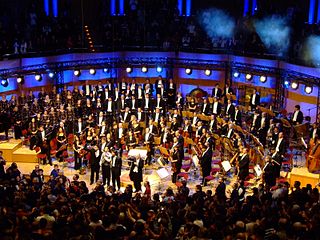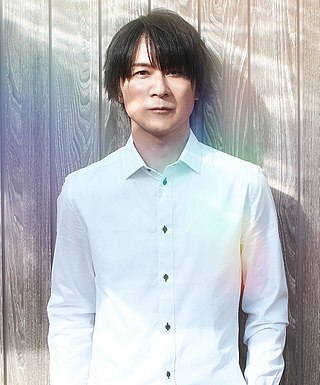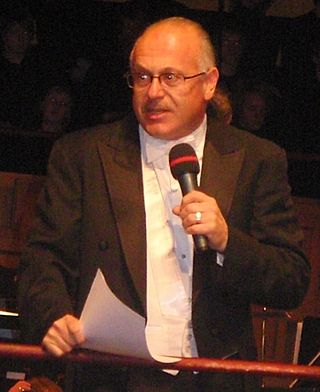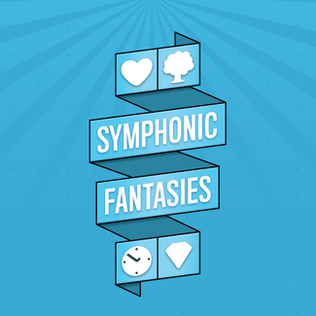
Nobuo Uematsu is a Japanese composer and keyboardist best known for his contributions to the Final Fantasy video game series by Square Enix. A self-taught musician, he began playing the piano at the age of twelve, with English singer-songwriter Elton John as one of his biggest influences in pursuing a musical career.

The Symphonic Game Music Concerts are a series of award-winning orchestral video game music concerts first performed in 2003 at the Gewandhaus in Leipzig, Germany, notable for being the longest running and the first of their kind outside Japan. They are produced by Thomas Böcker and performed by various orchestras conducted by Andy Brick (2003–2007), Arnie Roth, Niklas Willén and Eckehard Stier.

Jonne Valtonen is a Finnish composer, arranger and orchestrator. He is renowned for his contributions in the field of demoscene and tracker music, under the name Purple Motion, and with Future Crew.
The Black Mages were a Japanese instrumental rock band formed in 2002 by Nobuo Uematsu, Kenichiro Fukui and Tsuyoshi Sekito, who were three video game composers for Square and Square Enix. The band arranged Uematsu's Final Fantasy video game series-based compositions in a hard rock style often similar to progressive metal, achieved with the additional use of synthesizers. A year later the band expanded to six members with the addition of Keiji Kawamori, Michio Okamiya and Arata Hanyuda. In August 2010, Uematsu announced the band had been disbanded, but he would continue to perform rock arrangements of his music as a part of another similar band, known as the Earthbound Papas.

The Chrono series is a video game franchise developed and published by Square Enix. It began in 1995 with the time travel role-playing video game Chrono Trigger, which spawned two continuations, Radical Dreamers and Chrono Cross. The music of Chrono Trigger was composed primarily by Yasunori Mitsuda, with a few tracks composed by regular Final Fantasy composer Nobuo Uematsu. The Chrono Trigger soundtrack has inspired four official album releases by Square Enix: a soundtrack album released by NTT Publishing in 1995 and re-released in 2004; a greatest hits album published by DigiCube in 1999, published in abbreviated form by Tokyopop in 2001, and republished by Square Enix in 2005; an acid jazz arrangement album published and republished by NTT Publishing in 1995 and 2004; and a 2008 orchestral arranged album by Square Enix. Corresponding with the Nintendo DS release of the game, a reissued soundtrack was released in 2009. An arranged album for Chrono Trigger and Chrono Cross, entitled To Far Away Times, was released in 2015 to commemorate the 20 year anniversary of Chrono Trigger.
Final Fantasy VII is a role-playing video game by Square as the seventh installment in the Final Fantasy series. Released in 1997, the game sparked the release of a collection of media centered on the game entitled the Compilation of Final Fantasy VII. The music of the Final Fantasy VII series includes not only the soundtrack to the original game and its associated albums, but also the soundtracks and music albums released for the other titles in the collection. The first album produced was Final Fantasy VII Original Soundtrack, a compilation of all the music in the game. It was released as a soundtrack album on four CDs by DigiCube in 1997. A selection of tracks from the album was released in the single-disc Reunion Tracks by DigiCube the same year. Piano Collections Final Fantasy VII, an album featuring piano arrangements of pieces from the soundtrack, was released in 2003 by DigiCube, and Square Enix began reprinting all three albums in 2004. To date, these are the only released albums based on the original game's soundtrack, and were solely composed by regular series composer Nobuo Uematsu; his role for the majority of subsequent albums has been filled by Masashi Hamauzu and Takeharu Ishimoto.
The music of the video game Final Fantasy VI was composed by regular series composer Nobuo Uematsu. The Final Fantasy VI Original Sound Version, a compilation of all the music in the game, was released in Japan by NTT Publishing in 1994 and re-released by Square Enix in 2004. The album was released by Square Co./NTT Publishing in North America in 1994 under the name Kefka's Domain. Selected tracks from the official soundtrack were later released as part of the Music From FFV and FFVI Video Games album that was included with the release of Final Fantasy Anthology, and two EPs were produced containing character theme tracks entitled Final Fantasy VI Stars Vol. 1 and Vol. 2. A special orchestral arrangement of selected tracks from the game, arranged by Shiro Sagisu and Tsuneyoshi Saito, and performed by the Milan Symphony Orchestra, was released under the title Final Fantasy VI Grand Finale by NTT Publishing in 1994 and 2004, and a collection of piano arrangements, arranged by Shirou Satou and performed by Reiko Nomura, was released under the title Piano Collections Final Fantasy VI by Square/NTT Publishing in 1994 and by NTT Publishing in 2001. Additionally, a single containing unused and remixed tracks from the game was released as Final Fantasy VI Special Tracks by NTT Publishing in 1994.
The music of the video games Final Fantasy and Final Fantasy II was composed by regular series composer Nobuo Uematsu, who would go on to be the exclusive composer for the next eight Final Fantasy games. Although they were composed separately, music from the two games has only been released together. All Sounds of Final Fantasy I•II, a compilation of almost all of the music in the games, was released by DataM/Polystar in 1989, and subsequently re-released by NTT Publishing in 1994. Symphonic Suite Final Fantasy, an arranged album of music from the two games by Katsuhisa Hattori and his son Takayuki Hattori was released by DataM in 1989, and re-released by NTT Publishing/Polystar in 1994. Final Fantasy & Final Fantasy II Original Soundtrack, another arranged album, this time by Nobuo Uematsu and Tsuyoshi Sekito, was released in 2002 by DigiCube and again in 2004 by Square Enix.
The music of the video game Final Fantasy VIII was composed by regular series composer Nobuo Uematsu. The Final Fantasy VIII Original Soundtrack, a compilation of all music in the game, was released on four Compact Discs by DigiCube in Japan, and by Square EA in North America. A special orchestral arrangement of selected tracks from the game—arranged by Shirō Hamaguchi—was released under the title Fithos Lusec Wecos Vinosec Final Fantasy VIII, and a collection of piano arrangements—performed by Shinko Ogata—was released under the title Piano Collections Final Fantasy VIII.
The music of the video game Final Fantasy IV was composed by regular series composer Nobuo Uematsu. The Final Fantasy IV Original Sound Version, a compilation of almost all of the music in the game, was released by Square Co./NTT Publishing, and subsequently re-released by NTT Publishing. It was released in North America by Tokyopop as Final Fantasy IV Official Soundtrack: Music from Final Fantasy Chronicles, with one additional track. It has since been re-released multiple times with slight changes as part of the Final Fantasy Finest Box and as Final Fantasy IV DS OST. An arranged album entitled Final Fantasy IV Celtic Moon, containing a selection of musical tracks from the game performed in the style of Celtic music by Máire Breatnach, was released by Square and later re-released by NTT Publishing. Additionally, a collection of piano arrangements composed by Nobuo Uematsu and played by Toshiyuki Mori titled Piano Collections Final Fantasy IV was released by NTT Publishing.
The music of the video game Final Fantasy IX was composed by regular series composer Nobuo Uematsu. It was his last exclusive Final Fantasy score. The Final Fantasy IX Original Soundtrack, a compilation of all music in the game, was originally released on four Compact Discs by DigiCube in 2000, and was re-released by Square Enix in 2004. A Best Of and arranged soundtrack album of musical tracks from the game entitled Final Fantasy IX: Uematsu's Best Selection was released in 2000 by Tokyopop Soundtrax. Final Fantasy IX Original Soundtrack PLUS, an album of music from the game's full motion videos and extra tracks, was released by DigiCube in 2000 and re-released in 2004, and a collection of piano arrangements of pieces from the original soundtrack arranged by Shirō Hamaguchi and performed by Louis Leerink was released as Piano Collections Final Fantasy IX in 2001.

Press Start -Symphony of Games- is a series of Japanese video game music concerts introduced in 2006. It was initiated by several industry professionals and is sponsored by the Japanese publishing company Enterbrain.
Final Fantasy is a media franchise created by Hironobu Sakaguchi and owned by Square Enix that includes video games, motion pictures, and other merchandise. The original Final Fantasy video game, published in 1987, is a role-playing video game developed by Square, spawning a video game series that became the central focus of the franchise. The primary composer of music for the main series was Nobuo Uematsu, who single-handedly composed the soundtracks for the first nine games, as well as directing the production of many of the soundtrack albums. Music for the spin-off series and main series games beginning with Final Fantasy X was created by a variety of composers including Masashi Hamauzu, Naoshi Mizuta, Hitoshi Sakimoto, and Kumi Tanioka, as well as many others.

Arnold "Arnie" Roth is an American conductor, composer, and record producer, known for his expansive career in the music industry. Roth began his career as a professional violinist before founding AWR Music, where Roth became more involved as a producer of orchestral concerts and recordings. Roth is perhaps best known as the co-creator and Music Director of Distant Worlds: music from FINAL FANTASY, produced in collaboration with the video game company Square Enix. Distant Worlds has performed hundreds of sold-out concerts around the world and has produced six full-length albums of orchestral Final Fantasy music. Roth's son Eric is also a famed conductor.

Thomas Böcker is a German producer. He is the founder of Merregnon Studios and creative director of his orchestral music projects Merregnon and Game Concerts.

Symphonic Fantasies: Music from Square Enix was an award-winning symphonic tribute concert originally held in Cologne, Germany on September 12, 2009, at the Cologne Philharmonic Hall featuring video game music from Japanese game developer Square Enix. The concert featured symphonic movements based on the Kingdom Hearts series, Secret of Mana, the Chrono series, and the Final Fantasy series. It was produced and directed by Thomas Böcker, with arrangements provided by Finnish composer and musician Jonne Valtonen with assistance by Roger Wanamo. Due to overwhelming demand, a second concert was added at the König-Pilsener-Arena in Oberhausen, on September 11, 2009. Both performances were by the WDR Radio Orchestra Cologne and the WDR Radio Choir Cologne under conduction from Arnie Roth, with guest performers Rony Barrak and Benyamin Nuss joining the orchestra. Symphonic Fantasies was broadcast over radio on the WDR4 station and streamed live video online.

Merregnon Studios is a company based in Dresden, Germany, founded by Thomas Böcker. It produces recordings and concerts worldwide, including the orchestral Merregnon and Game Concerts series.

Symphonic Odysseys: Tribute to Nobuo Uematsu was a symphonic tribute concert first held in Cologne, Germany on July 9, 2011 at the Cologne Philharmonic Hall. The concert exclusively paid homage to the work of Japanese composer Nobuo Uematsu and featured music selected from his works as a video game music composer. Among the games featured were Lost Odyssey, Blue Dragon, Last Story, King's Knight, Chrono Trigger, Final Fantasy Legend, and selected works from the Final Fantasy series. The concert was produced and directed by Thomas Böcker, with arrangements provided by Finnish composer and musician Jonne Valtonen, along with Roger Wanamo, Masashi Hamauzu, and Jani Laaksonen. The concert was performed by the WDR Rundfunkorchester Köln and the WDR Radio Choir Cologne under conduction from Arnie Roth, with guest performers Benyamin Nuss and Juraj Čižmarovič joining the orchestra. A video recording of Symphonic Odysseys was streamed live online. The concert was initially scheduled for a single performance, but after selling out within twelve hours a second concert was added prior in the same day in Cologne. This too sold out, resulting in a total attendance of over 4000.

Final Symphony is a symphonic concert tour first held at the Historische Stadthalle Wuppertal in Wuppertal (Germany) on May 11, 2013. The concert tour features arrangements of video game music selected from the Final Fantasy series, specifically Final Fantasy VI, VII, and X. It is divided into three acts: a symphonic poem for VI, a piano concerto for X, and a symphony for VII. The concert is produced and directed by Thomas Böcker, with arrangements provided by Finnish composer and musician Jonne Valtonen, along with Roger Wanamo and Final Fantasy X composer Masashi Hamauzu with consultation from Final Fantasy composer Nobuo Uematsu. The original works were composed by Uematsu and Hamauzu, and an introductory piece was composed by Valtonen. The premiere concert was performed by the Wuppertal Symphony Orchestra under conduction from Eckehard Stier, with guest performer Benyamin Nuss joining the orchestra on piano.

Final Symphony II is a symphonic concert tour first held at the Beethovenhalle in Bonn, Germany on August 29, 2015. The concert performances feature arrangements of video game music selected from the Final Fantasy series, specifically Final Fantasy V, VIII, IX, and XIII. It is divided into four acts, one per game, with the newest game, Final Fantasy XIII, first, and the oldest, V, last; all four arrangements are single-section arrangements, with the IX portion as a piano concerto. The tour is a follow-up to Final Symphony, a similar tour of orchestral arrangement performances from Final Fantasy VI, VII, and X beginning in 2013. The concert is produced and directed by Thomas Böcker of Merregnon Studios, with arrangements provided by Finnish composer and musician Jonne Valtonen, along with Roger Wanamo and Final Fantasy XIII composer Masashi Hamauzu. The original works were composed by Nobuo Uematsu and Hamauzu, and an introductory piece was composed by Valtonen. The premiere concert was performed by the Beethoven Orchestra Bonn under conduction from Eckehard Stier, with guest performer Mischa Cheung joining the orchestra on piano.












